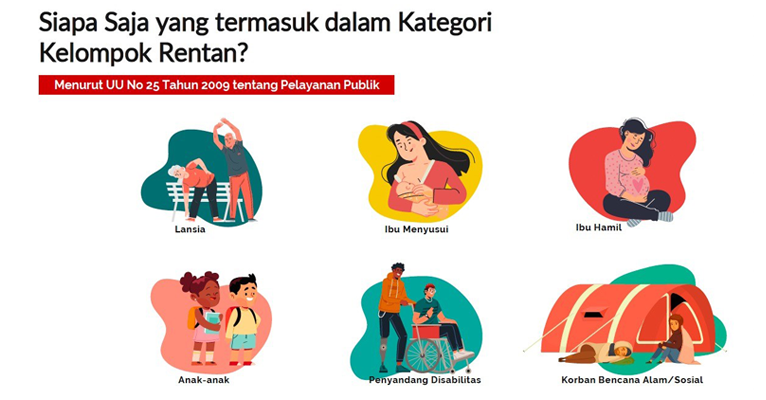Saat ini perdagangan internasional sedang menikmati kebijakan tarif rendah sebagai dampak dari sistem perdagangan bebas.…

BPIPI SERVICE INNOVATION: INCLUSIVE AND COLLABORATIVE
BPIPI's important agenda: Collaborative Inclusive
The question arises why public service organizations must be inclusive?, and how to understand public services that are inclusive and friendly to vulnerable groups?. The above question must be understood as a paradigm shift phenomenon of public service organizations in Indonesia. The demands for information disclosure, the integrity of public servants and the effectiveness of the bureaucracy, which are the main drivers of various public service innovations in Indonesia, don't seem fair enough when there is a new push for easy accessibility of public services for all people and groups.
Even though it requires a long process, since Law No. 25 of 2009 concerning Public Services was first published, the categories of vulnerable groups have been fully explained. The groups that are obliged to receive the same services according to the mandate of the law are the elderly, children, breastfeeding mothers, persons with disabilities, pregnant women and victims of natural/social disasters. These groups have equal rights to participate and contribute to public services.
BPIPI, as a public service unit within the Ministry of Industry, always carries out inclusive and collaborative public service transformation agendas. One of BPIPI's priority agendas for 2023 is improving infrastructure as an effort to improve inclusive service infrastructure. These efforts are to increase accessibility which ensures the participation of vulnerable groups through several important changes in BPIPI services. Service accessibility at BPIPI will gradually encourage the involvement of vulnerable groups in every service, encourage persons with disabilities to gain equal experience, open access to basic services and reasonable mix-ups between persons with disabilities and non-disabled persons.
Apart from the priority of inclusive services at BPIPI, another important agenda is collaborative. Even though this has become a regular agenda for BPIPI, with the existence of inclusive services, BPIPI believes that in the future this inclusive service must also have a collaborative meaning. Currently BPIPI's collaborative agenda is still limited to the function of strengthening the industrial value chain in the footwear industry ecosystem. In the future, the collaborative agenda must also provide support to vulnerable groups to have the same opportunity to contribute to the industrial ecosystem
How does BPIPI translate into programs and activities?
Why is collaborative inclusiveness important for public service units like BPIPI in the future? Of course the answer is because of the need for organizations to continue to make changes. Then how does BPIPI translate this inclusive and collaborative agenda?
Konsep inklusif dan kolaboratif adalah konsep yang berbeda, namun mempunyai prinsip yang sama yakni mempromosikan partisipasi dan keterlibatan aktif individu atau kelompok dalam suatu interaksi atau kerjasama. Pendekatan dua konsep yang berbeda ini adalah ingin memastikan bahwa semua pihak yang terlibat mempunyai aksesibilitas yang sama, didengar, dihargai dan mempunyai kesempatan yang sama untuk berkontribusi dalam mengambil keputusan.
Several important elements of an inclusive and collaborative approach that will be adopted by BPIPI in realizing plenary services are as follows:
- Involvement of all parties: Inclusive and collaborative approaches emphasize the importance of involving all individuals or groups.
- Respect for diversity: In an inclusive and collaborative environment, differences are valued as a source of wealth that can lead to greater understanding and more creative solutions.
- Open communication and dialogue: Inclusive collaboration requires open communication, dialogue and active listening between all parties involved.
- Equality and fairness: An inclusive and collaborative approach aims to create a fair and equal environment where every individual or group is treated with respect and has equal opportunities to participate and contribute.
- Sharing of responsibilities: Inclusive collaboration involves an equal sharing of responsibilities between all parties involved. This includes acknowledging and strengthening the role of each individual or group in decision-making processes and implementing actions.
By adopting an inclusive and collaborative approach, BPIPI can create an environment that promotes strong collaboration, creativity and innovation, while ensuring that all voices are heard and valued.

Alfiyan Darojat


